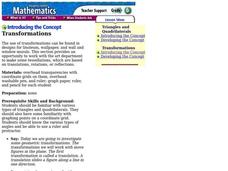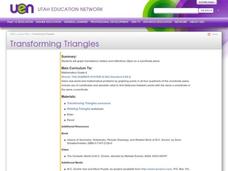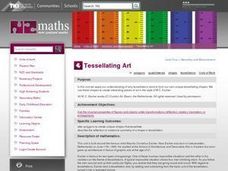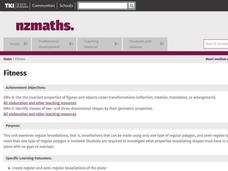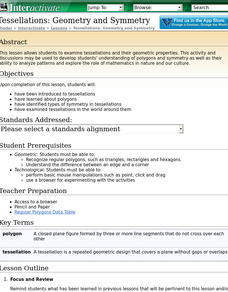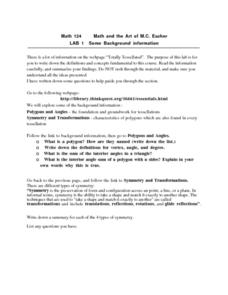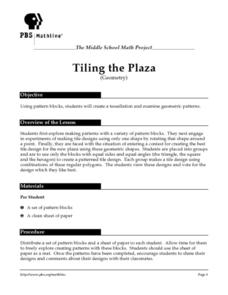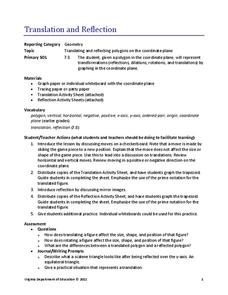Curated OER
Transformations
Students draw on graph paper. In this geometry lesson, students review types of triangles and quadrilaterals. Students investigate geometric transformations, including translation, rotation and reflection. Students practice each...
Curated OER
Polynominoes
In this polynominoes worksheet, students solve 9 different types of polynominoes problems. First, they identify that a polynominoe is a polygon made from squares of the same size and connected to each square. Then, students determine how...
Curated OER
Let's Tesselate
Students investigate the geometrical concepts of translation, reflection, and rotation. They make different observations looking for the concepts that are displayed in classroom items like floor tiles, carpet designs, and visuals hung in...
Creative Educator
Tessellation Sensation
Geometers investigate patterns and symmetry, and examine the artwork of M.C. Escher on the Internet. They compare his style to the floor and ceiling tiles in the classroom. If you have ImageBlender™ software, you could have your...
Curated OER
Transforming Triangles
Sixth graders graph translations (slides) and reflections (flips) on a coordinate plane. They visualize and identify geometric shapes after applying transformations on a coordinate plane. Finally, 6th graders write a paragraph telling...
Curated OER
Tessellating Art
Fourth graders create artwork showing their own unique tessellating shapes. They apply the symmetries of a regular polygon and describe the reflection or rotational symmetry of a figure or object. They share their art work with the class.
NTTI
Transform Your Geometry into a Work of Art
Mathematicians utilize artwork to help illustrate the major ideas of transformations and tessellations. They visually identify transformations including reflections, rotations, and translations. They discuss how artists have used...
Curated OER
Symmetry In Nature
Learners investigate the symmetry that is found in nature. They view shapes and patterns in nature while looking at images. Students look for tessellations while obtaining photographs with a digital camera. The information is used for...
Curated OER
Logo Licenses
Third graders find all the lines of reflection symmetry in a given shape, identify the order of rotational symmetry of a given shape. They create designs which have reflection symmetry, rotational symmetry (orders 2, 3, 4, 6) and...
Curated OER
Fitness
Fourth graders determine how to design regular and semi-regular tessellations of the plane. They develop the ability to demonstrate why a tessellation covers the plane in this series of lessons.
Curated OER
Geometry and Symmetry
Learners examine tessellations and their geometric properties. The lesson and discussions may be used to develop students' understanding of polygons and symmetry as well as their ability to analyze patterns.
Curated OER
Chapter 19 Word Search
Here is a geometry worksheet in which learners locate and identify various vocabulary terms related to geometry. There are twelve words located in the puzzle.
Curated OER
Geometry in Tessellations
Students examine tessellations and their geometric properties. Students also develop a better understanding of lines, planes, angles, and polygons.
Curated OER
Fold and Cut 2
Second graders make, name, and describe, using their own language and the language of geometry, everyday shapes and objects. They create and discuss geometric patterns which repeat (show translation), or which have rotational or...
Curated OER
Twists and Turns
Students reflect, rotate, translate, and dilate figures in the Cartesian coordinate plane using grid paper and dot paper. They use transformations (i.e., reflections, translations, rotations, and dilations) to describe geometric patterns...
Curated OER
Math Lab
For this polygons and angles worksheet, 10th graders complete 5 different questions related to polygons and angles, in addition to symmetry and transformations. First, they define polygon and how they are named. Then, students define...
Curated OER
Fold and Cut
Second graders explore line symmetry and the names and attributes of two-dimensional mathematical shapes. They study the context by folding and cutting out shapes to make a series of mathematical shapes.
Curated OER
Tiling with Pentominoes
In this tiling with pentominoes worksheet, 10th graders solve 3 different problems related to tiling with pentominoes. First, they define pentomino as a type of polygon and locate 10 other pentomino shapes in the figure shown at the top....
Curated OER
Tiling the Plaza (Geometry)
Middle schoolers make patterns with a variety of pattern blocks. Pupils experiment with making tile designs using only one shape by rotating that shape around a point. They enter a contest for creating the best tile design for the new...
Curated OER
Symmetry: Theory, Reality and Art!
Students explore the concept of geometric symmetry. In this geometric symmetry lesson, students walk around their school and take pictures of objects that demonstrate symmetry. Students use Microsoft Paint to draw the lines of symmetry...
Houghton Mifflin Harcourt
Unit 6 Math Vocabulary Cards (Grade 5)
Acute angles, nets, and vertices are only a few terms that a set of flash cards includes. Among the 108 cards, two types are available; word cards printed in bold-faced lettering, and corresponding definition cards equipped with an...
Virginia Department of Education
Translation and Reflection
Bring about the change you want to see in the world or at least in your lesson plans. Young mathematicians learn about translation and reflections by applying them to polygons on the coordinate plane. Results provide data to...
Curated OER
Performing Transformations
Students investigate the concepts relating to creating a tessellation. They include using pattern blocks in order to create interconnecting patterns. Students review translations, rotations, and reflections.
Curated OER
Copycats
Third graders describe the features of 2 and 3 dimensional objects and use the language of geometry. They design and make a pattern which involves translation, reflection or rotation.


